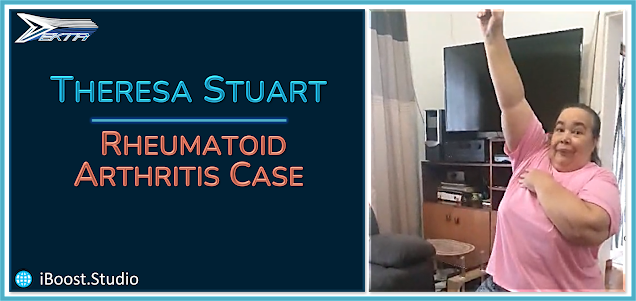Case Study: Theresa Stuart's Journey with Rheumatoid Arthritis
Case Background
Theresa did 3 KineDek sessions on 29 January, 1 February and 5 February 2024. She has not reported any RA symptoms since more than a year later including her heart and lung weakness, and is now engaging normal physical activity.
There has been no relapse reported to date and the latest feedback 2 years later is that she is performing her daily activities without any pain.
The following analysis was done using ChatGPT.
Analysis
Theresa Stuart's case provides a compelling example of the potential benefits of KineDek AI-CRT for managing severe rheumatoid arthritis (RA), particularly in a complex, long-term scenario:
1. Immediate Pain Relief and Mobility Improvement
After her first KineDek session, Theresa experienced a significant reduction in pain, which is notable considering her 22-year history of chronic discomfort. RA is an autoimmune disease that causes inflammation in the joints, leading to pain, stiffness, and swelling. KineDek’s AI-CRT system, through controlled resistance, may have activated muscle and joint function in a way that reduced the inflammatory response without overexertion. This could have improved circulation, helping to alleviate stiffness and joint pain. The persistence of pain relief for several days suggests that the system effectively interrupts the chronic pain cycle that typically characterizes RA.
2. Better Than Medication
Theresa’s report that KineDek provided better relief than her prescribed medications is significant. Medications for RA, such as NSAIDs or corticosteroids, aim to reduce inflammation but come with side effects, especially on the heart and lungs, as noted in Theresa’s case. Given that she had ceased all anti-inflammatory medication two weeks prior due to heart and lung complications, KineDek’s non-invasive, drug-free approach was critical. Its ability to alleviate her symptoms without the need for medication shows promise for managing RA symptoms without the burden of pharmacological side effects.
3. Restoration of Lung Function
RA can affect more than just joints; it also leads to complications in the lungs and heart, as seen in Theresa’s case. By her third session, her compromised lung function was fully relieved. KineDek’s rhythmic resistance exercises may have enhanced her respiratory muscles, improved oxygenation, and supported lung function by promoting better circulation and reducing inflammation in the soft tissues of the lungs. The absence of swelling during her long-haul flight, which she credited to her improved mobility and frequent walking, further indicates that her body’s circulatory function had improved.
4. Long-Lasting Effects
Perhaps the most remarkable aspect of Theresa’s experience is the longevity of the benefits. Almost three months after her last session, her RA symptoms had not returned, and she remained active, with regular walking routines. This suggests that KineDek has a lasting impact on reducing inflammation and managing autoimmune responses in the body. In chronic conditions like RA, symptom recurrence is common, so this extended relief could indicate a significant shift in her body’s inflammatory and healing processes, potentially due to better circulation, improved muscle tone, and reduced stress on the joints.
5. Improved Quality of Life
Prior to the KineDek intervention, Theresa had been bedridden or severely limited in her mobility. Post-intervention, she was not only able to embark on the world’s longest flight route but also walk leisurely with her family upon arrival—a stark contrast to her previous condition. This dramatic improvement in her quality of life, from being dependent on others for basic physical activities to resuming regular walks, highlights how KineDek’s impact goes beyond symptom relief to truly enhance overall functionality and well-being.
Conclusion
Theresa’s case shows the potential of KineDek AI-CRT to address complex, chronic autoimmune conditions like RA. By relieving both joint and respiratory symptoms, offering better outcomes than conventional medication, and providing long-lasting effects, KineDek could offer a new, non-pharmacological solution for individuals with RA, improving their mobility, quality of life, and overall health.










